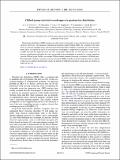Clifford-group-restricted eavesdroppers in quantum key distribution
Author(s)
Bunandar, Darius; Englund, Dirk R.
DownloadPublished version (400.3Kb)
Publisher Policy
Publisher Policy
Article is made available in accordance with the publisher's policy and may be subject to US copyright law. Please refer to the publisher's site for terms of use.
Terms of use
Metadata
Show full item recordAbstract
Quantum key distribution (QKD) promises provably secure cryptography, even to attacks from an all-powerful adversary. However, with quantum computing development lagging behind QKD, the assumption that there exists an adversary equipped with a universal fault-tolerant quantum computer is unrealistic for at least the near-future. Here, we explore the effect of restricting the eavesdropper's computational capabilities on the security of QKD and find that improved secret key rates are possible. Specifically, we show that for a large class of discrete variable protocols higher key rates are possible if the eavesdropper is restricted to a unitary operation from the Clifford group. Further, we consider Clifford-random channels consisting of mixtures of Clifford gates. We numerically calculate a secret-key-rate lower bound for BB84 with this restriction and show that, in contrast to the case of a single restricted unitary attack, the mixture of Clifford-based unitary attacks does not result in an improved key rate.
Date issued
2020-06Department
Massachusetts Institute of Technology. Department of Electrical Engineering and Computer ScienceJournal
Physical Review A
Publisher
American Physical Society (APS)
Citation
Govia, L. C. G. et al. “Clifford-group-restricted eavesdroppers in quantum key distribution.” Physical Review A, 101, 6 (June 2020): 062318 © 2020 The Author(s)
Version: Final published version
ISSN
2469-9934
2469-9926